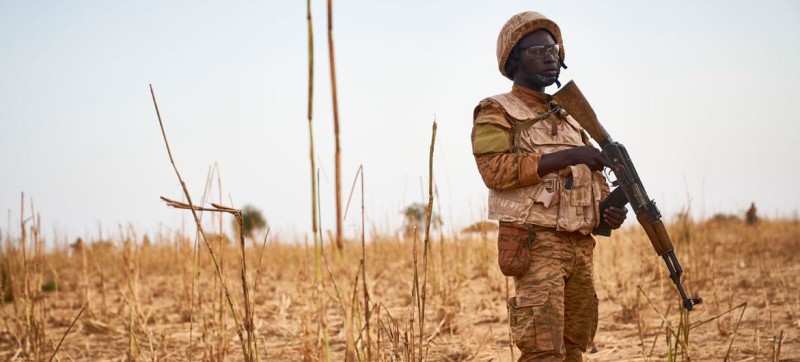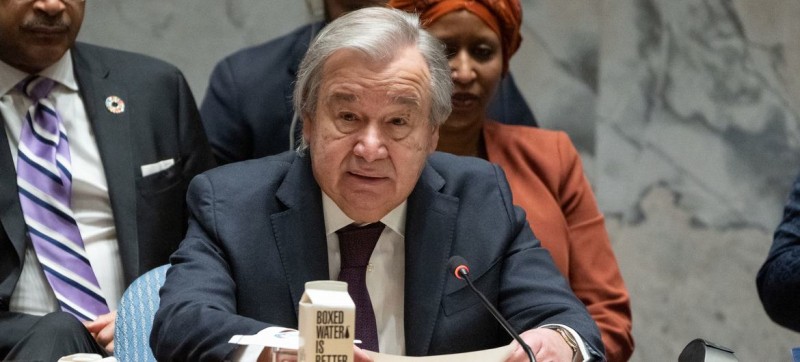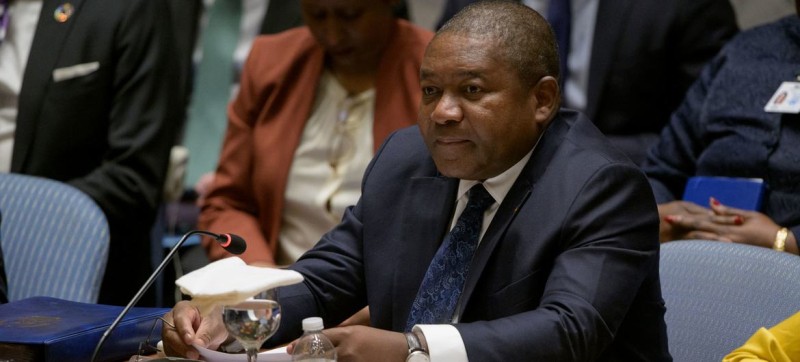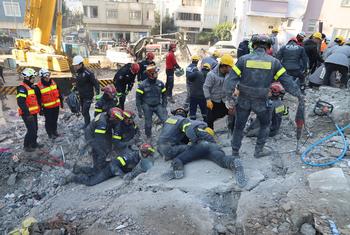Play video

© Michele Cattani A soldier from Burkina Faso stands guard along the border with Mali and Niger during a military operation against terrorist suspects.
Leaders from across the continent joined ambassadors in examining how to counter terrorism and better prevent violent extremism through stronger cooperation between the UN and regional organizations.
Tweet URL
The debate was chaired by President Filipe Nyusi of Mozambique. The country, which holds the rotating Security Council presidency this month, has been battling a deadly insurgency in the north for more than five years.
‘Fertile ground’ for expansion
The Secretary-General expressed deep concern over the gains which terrorist groups are making in the Sahel and other parts of Africa.
“Despair, poverty, hunger, lack of basic services, unemployment, and unconstitutional changes in government continue to lay fertile ground for the creeping expansion of terrorist groups to infect new parts of the continent,” he said.
Furthermore, fighters, funds and weapons are increasingly flowing between regions and across the continent, he said, while terrorist groups are forging new alliances with organized crime networks and piracy groups. Their “violent ideologies” are also being spread online.
United against terrorism
“Just as terrorism drives people apart, countering it can bring countries together,” said Mr. Guterres, pointing to several initiatives across Africa, including in the Sahel, the Lake Chad Basin and Mozambique.

UN Photo/Eskinder Debebe UN Secretary-General António Guterres addresses the Security Council meeting on threats to international peace and security caused by terrorist acts.
“The United Nations stands with Africa to end this scourge,” he added. “Above all, it includes our ongoing close collaboration with the African Union (AU) and regional and sub-regional African organizations.”
Mr. Guterres said the UN is delivering tailored assistance to African countries in areas that include prevention, legal assistance, investigations, prosecutions, reintegration and rehabilitation.
Uphold human rights
Alongside Nigeria, the UN is also co-organizing the upcoming African Counter Terrorism Summit and is strengthening work together on important peace initiatives. The Organization also advocates for new AU-led “robust” peace-enforcement missions and counter-terrorism operations, with Security Council mandates. He urged countries to support this vital work.
The Secretary-General also looked to June, when the UN Global Counter-Terrorism Strategy, adopted in 2006, undergoes its eighth review. This will mark a “critical opportunity” for countries to find new ways to more effectively tackle the conditions that create the fertile ground for terrorism to spread.
The meeting will also serve as a reminder that human rights must be at the centre of counter-terrorism efforts, he added.
“Evidence shows that counter-terrorism efforts that are solely security-focused rather than human-rights based, can inadvertently increase marginalization and exclusion, and make the situation even worse,” he said.
Terrorist ‘contagion’ continues
The new AU Chairperson, President Azali Assoumani of Comoros, noted that although terrorism has been around for ages “since the Libyan crisis in 2011 it has really exploded, and particularly in Africa.”
As a result, thousands of foreign fighters and combatants flooded into the Sahel, which helped with importing terrorist groups onto the continent, along with “an uncontrollable circulation of weapons”.
“In this way, progressively, terrorism took on greater and greater scope in Africa – from north to south, from east to west. And the terrorist contagion continues, broadening in almost all regions of Africa,” he said, speaking through an interpreter.
He vowed to “spare no effort” to ensure an AU flagship initiative to “silence the guns” by 2030, becomes a reality.

UN Photo/Manuel Elías Filipe Jacinto Nyusi, President of the Republic of Mozambique, chairs the Security Council meeting on threats to international peace and security caused by terrorist acts.
Different contexts, global threat
Like climate change, terrorism is among the most serious threats to the international community, said President Nyusi of Mozambique, delivering his first-ever remarks to the UN Security Council.
“The expansion of terrorism is quite threatening, and it is driven by factors that vary from context to context. On one hand, radicalization based on identity variables fuelled by intolerance and, on the other hand, the manipulation of socio-economic factors have accelerated recruitment to terrorist groups, particularly of the youth,” he said, speaking through an interpreter.
Citing the 2022 Global Terrorism Index, he reported that some 48 per cent of terrorism-related deaths occurred in Africa, while the Sahel is the “new epicentre” of terrorist attacks.
African expertise and solutions
President Nyusi said African countries, the AU and regional organizations on the continent – such as the Southern African Development Community (SADC), the West African bloc ECOWAS, and its East African counterpart, IGAD – have accumulated years of experience in conflict resolution.
A SADC Mission in Mozambique (SAMIM) has been fighting terrorists in the northern province of Cabo Delgado for nearly two years – an example of “African solutions to African problems” and an approach that could be replicated elsewhere.
“For Mozambique, this experience is vested with an added value, as, presently we are fighting terrorism combining SADC regional multilateral efforts with bilateral efforts between Mozambique and Rwanda, and together we are successfully fighting terrorism,” he said.
Fund youth job schemes
President Nyusi also offered proposals for the upcoming review of the UN Global Counter-Terrorism Strategy, urging countries to establish a fund that would strengthen local community resilience, including through job creation projects for young people, particularly in Africa and the Middle East.
His other recommendations included prioritizing support for regional solutions to combat terrorism, and promoting a holistic approach that combines, security, judicial and socioeconomic interventions.
He also highlighted the need to support developing countries which are unable to respond effectively to the impacts of “climate change and other man-made crises” because they are saddled with debt.
Transform international finance
He warned that the situation makes these countries increasingly vulnerable to extremism, terrorism and violent conflict.
“For these countries to emerge from the current crisis, we call on the international community to restructure the debt and facilitate access to affordable funding for these high-risk countries,” he said.
“To this end, the international financial system needs to be transformed by reforming multilateral financial institutions.”

Türkiye-Syria Earthquake
DONATE!
Emergency and search-and-rescue teams have deployed to assess and prioritize urgent needs and to provide life-saving assistance following the devastating earthquake near the Türkiye-Syria border.

